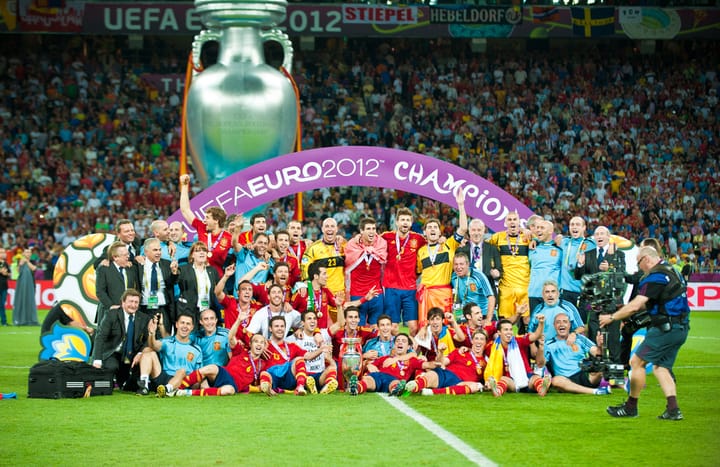The Unforgettable Journey: Canada's Triumph at the 2000 CONCACAF Gold Cup
This is the incredible story of Canada's triumph at the 2000 CONCACAF Gold Cup.

In the history of Canadian soccer, there is one tournament that stands out as a testament to resilience, determination, and sheer underdog spirit. The year was 2000, and the stage was set for the CONCACAF Gold Cup. Canada, a team with a modest reputation and ranked 85th in the world at the time, embarked on a remarkable journey that would culminate in an improbable victory.
For the Canadian men's national team, success on the international stage had been elusive for many years. Apart from a solitary World Cup appearance in 1986, the team had endured a string of disappointments and setbacks. Their reputation as underdogs struggling to make an impact seemed firmly entrenched, with eight consecutive failed attempts to qualify for the World Cup. However, amidst the doom and gloom, a glimmer of hope emerged in 2000.
The 2000 edition of the Gold Cup featured twelve teams, including three invited countries: Colombia, Peru, and South Korea. Canada, with its low FIFA ranking, entered the tournament as the lowest-ranked side. Placed in a tough group alongside Costa Rica and South Korea, the odds were stacked against them. The team from Canada, under the direction of German head coach Holger Osieck, included unpopular players who were largely unknown on the international stage.
In their first group game against Costa Rica, played at the Qualcomm Stadium in San Diego, Canada, they showcased their resilience. Despite conceding an early goal, forward Carlo Corazzin's brace secured a hard-fought draw. The result set the tone for Canada's campaign, demonstrating their determination to compete against higher-ranked opponents.
The second group game saw Canada face South Korea at the Los Angeles Memorial Coliseum. In a tightly contested encounter, neither side could break the deadlock, resulting in a goalless draw. Canada's defensive discipline and structured gameplay frustrated the Koreans, leaving qualification for the next round hanging by a thread.
With Canada and South Korea deadlocked on points, goals scored, and goals conceded, an extraordinary turn of events unfolded. The final group game between Costa Rica and South Korea held the key to Canada's fate. If either side won or scored less than two goals in a draw, Canada would advance. However, a score draw of more than three goals would eliminate Canada. In a twist of fate, the game ended in a 2-2 draw, leading to a historic coin-toss tiebreaker. South Korea won the toss, but fate favored Canada as the coin landed on tails. Against all odds, Canada advanced to the quarterfinals.
In the quarterfinals, Canada faced off against Mexico, the three-time consecutive Gold Cup champions and the tournament favorites. The odds were heavily stacked against Canada, but they refused to be intimidated. With a compact defensive shape and disciplined play, Canada frustrated the Mexican team. Midfielder Martin Nash's pinpoint cross found Carlo Corazzin, who rose highest to head home the equalizer. The game went to extra time, and it was there that Canadian fullback Richard Hastings etched his name in Canadian soccer folklore. A swift counter-attack led to Hastings slotting the ball into the Mexican net, sealing a historic 2-1 upset victory for Canada.
In the semi-finals, Canada faced Trinidad & Tobago, a team boasting talented players such as Hibernian's Russell Latapy and Manchester United's Dwight Yorke. The match proved to be a tense affair, with Canada's goalkeeper, Craig Forrest, pulling off numerous saves to keep the game level. In the 68th minute, a cross from Jim Brennan found Carlo Corazzin, whose header was met by defender Mark Watson, giving Canada the lead. The Canadian defense held firm, and for the first time in history, Canada reached the Gold Cup final.
On February 27th, 2000, Canada took to the field at the Los Angeles Memorial Coliseum for their first-ever Gold Cup final. The opponent was Colombia, an invited team from South America. Canada had already earned the title of best in CONCACAF, but they hungered for the trophy. The stage was set for an epic showdown.
Just before halftime, a corner kick presented Canada with an opportunity. Martin Nash's delivery found Jason de Vos, whose headed effort crept just over the line. Canada took the lead, igniting a wave of jubilation among the players and fans alike. The goal injected belief and confidence into the Canadian team, setting the stage for an unforgettable second half.
In the second half, Canada had a chance to double their lead when Colombian goalkeeper Diego Gómez brought down Jeff Clarke in the box. Carlo Corazzin stepped up to take the penalty and calmly slotted it home. The 2-0 lead gave Canada a comfortable cushion, but they remained vigilant, knowing that a two-goal lead against a talented Colombian side was far from secure. Colombia was awarded a penalty late in the game, but Craig Forrest's heroics in goal ensured that the ball never found the back of the net. When the final whistle blew, Canada celebrated a historic 2-0 victory, clinching their first major championship.
Canada's triumph in the 2000 CONCACAF Gold Cup marked a turning point in the nation's soccer history. The victory brought recognition and respect to a team that had long been considered an underdog. Individual accolades followed, with Carlo Corazzin winning the Golden Boot as the tournament's top scorer and Craig Forrest being named the tournament's best player. The triumph demonstrated the potential of Canadian soccer and provided a glimmer of hope for a future filled with success.




